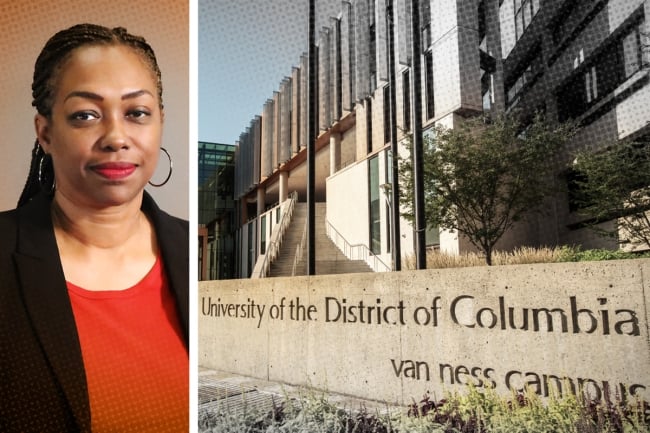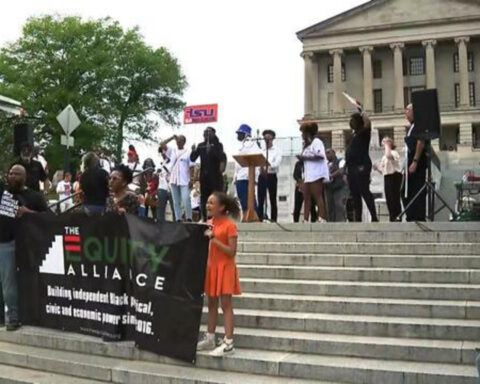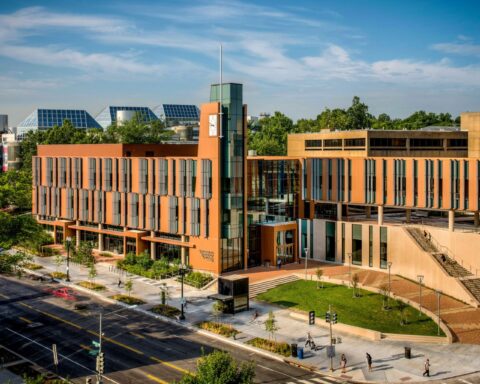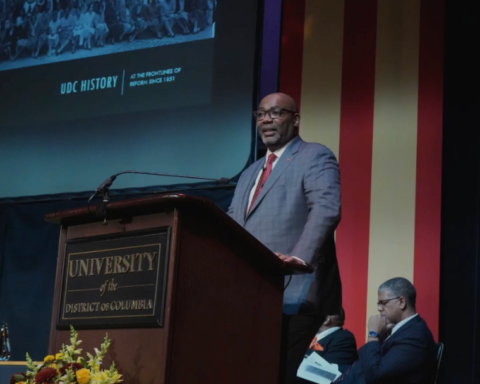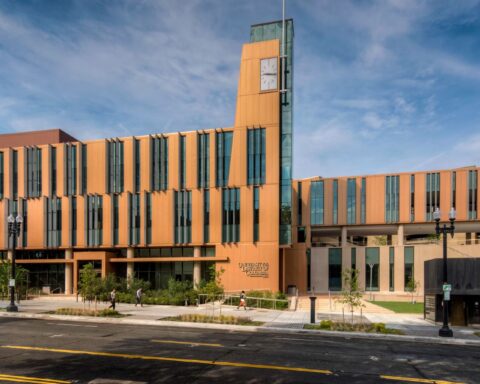By Ashley Mowreader
Ruthie Little-Berry has spent two decades working in higher education, but she first identified her passion for students working as a recruiter during her master’s program on the road talking to students about the power of a college degree.
“You’re literally changing people’s lives when you help bring them into a higher education environment,” says Little-Berry, who goes by Teri. “Particularly if you’re working with minority students, you are working with students who are deemed to be at risk most of the time. So it’s an opportunity to really help change their trajectory in life.”
This past fall, Little-Berry started at the University of the District of Columbia as the chief student development and success officer. In this role, Little-Berry heads retention and persistence work for D.C.’s only public university, also a historically Black university, and its connected community college.
She spoke with Inside Higher Ed about her work, her philosophy for student success and the student experience, plus how the COVID-19 pandemic has changed learners and higher education’s approach to serving students.
Q: What led you to this role at UDC and what’s included in your purview?
A: This is my twenty-fourth year in higher ed, over time, starting out as a college recruiter and then becoming an assistant director in the admissions office. I’ve worked in career services and in other different areas, international student services.
I started out at an HBCU in Jacksonville, Florida, left there and went into the community college system in Florida. Made my way to Ohio, just progressing through the ranks, and then went to Florida A&M University. And our current president [at UDC], I worked with him at Florida A&M University. So when he became the president of the University of the District of Columbia, he provided me with an opportunity to come here and expand my role and my reach in terms of how we work with students and impact them.
In my purview, there are a ton of things. We’ll start with, of course, undergraduate and graduate admissions, the office of financial aid, academic advising, international student support services, the career center. We also have an office for academic coaching—academic coaches work with students’ study skills—TRIO programs, diversity and inclusion, residential life, athletics, student life, all of the things; I would say the majority of the things that impact students outside of the classroom, that make the unique university or college experience.
Q: UDC is an HBCU—how does that mission impact your work with students?
A: Being an HBCU is incorporated into the work, because it comes with this historical perspective—HBCUs tend to produce the most African-American college graduates.
However, what is unique about UDC is that although we are an HBCU, our student demographics are pretty balanced—we have just as many non–African American students as we do other students, and I think it is we are reflective of the makeup of the district and the DMV [D.C., Maryland, Virginia] area.
I’m proud to say that our enrollment reflects the area we were created to serve. We have a growing Hispanic population, but we also are a melting pot like America … of people from different ethnicities and races and backgrounds, and even countries that are on our campus and are having such a huge, I will say they give us a great, great advantage, because we’re able to have all of those cultures on our campus, which helps students learn and expand their exposure to various cultures.
Q: What are the biggest challenges you’re seeing with students and their success?
A: Coming out of COVID, a lot of students needed more counseling. We’re seeing a rise—and that’s not anything different from what’s happening at colleges and university campuses across the country—we’re also dealing with that here.
So making sure our students have access to counseling and other support services, whether that’s health services needing to be in in a group counseling session, or an individual session. Making sure that we’re offering those things or even bringing in outside social support services to help our students. We have an office of student advocacy and outreach, so if students are new, or needing to be connected to some of the other support social support services that you wouldn’t typically see on a college campus, then we’re trying to get them connected to those support services.
Q: You’ve spent two decades in higher education working with students. How are students different or the same in 2024?
A: What stays the same: Students tend to think that they know best and they are right. If you’ve ever been to college, then we’ve all been there, right? We all felt like, “No, I know what’s best for me and this is what I have to do, or this is what I need you to do.”
In terms of what has changed, I consider pre-COVID like the old world, and post-COVID the new world. And in this new world, unfortunately, there was such a learning gap. We knew that there were learning gaps before, but I think COVID helped to exacerbate that. So really helping students academically get back on track, I think we have to put more effort into helping them feel like they’re on sure footing. People lost a lot: they lost family, they saw a lot of things that weren’t typical beforehand. Particularly here in America, it wasn’t [like] something that we had experienced.
When we think about what’s important, as student success leaders at this point—students are different, and their needs are different. We have yet to find out all of the impacts that COVID [has] had on education and on students and their ability to learn, whether it’s the mental health aspect or what have you. It’s really important as student success leaders, that we focus on bringing those things, helping students understand what they may be feeling, what they may be dealing with.
We do that with a sense of accountability for ourselves, but also for our students. Because as much as we might want our students to be successful, they have to own a part of that success is well, so really working with our students to help them see that they own that, and they have to be advocates for themselves. We can’t read minds, but once they tell us, then we can help provide services or we can help guide them to services, be it on our campuses or in the community, that can help them become their best selves.
The halls and walls of a college or university should be the safe place for them to grow, develop, [and] sometimes make mistakes that we can help coach them through, so that when they do leave us, they’re going out into the world, they’re representing our college or university, they’re representing themselves, but they’re doing it in such a way that they understand and are in a better place to advocate for themselves and their needs.
Q: How does this change your work at UDC?
A: I think that we are working to, again, ensure their footing, making them feel like they’re on solid ground, creating a sense of belonging, really bringing them into the fold, really helping them to be able to ask for help, and then allowing us to be able to help them. It’s not easy for everybody to do that. And so for us, making sure that we are academically meeting their needs, without making them feel like they don’t belong.
I think the part of that which makes us unique is that, you can come into the UDC family—you may not start out at the Van Ness campus or on the four-year side—but we have a community college and so you can start at the community college and really build your skill sets and then make the transition into the actual four-year program without ever having to change schools. You might change location, but you’re not having to change your school.
So we can create this whole sense of coming in the door, getting that nurturing that you need at the very beginning, and then allowing you to mature, in the process of stepping away as much as you need to, as you mature and as you matriculate in your programs.
Q: What is your philosophy for student success?
A: My perspective regarding student success is that student success starts prior to a student arriving on campus.
We engage in activities that help to facilitate students beginning successfully. We have work that we have to do before they even arrive on campus, typically, because we are primarily a nonresidential campus. That means unlike more traditional campuses, students may come in, and they’re on campus for orientation for two or three days, that kind of thing, that’s not the case at UDC. So we really have to think outside the box in terms of our programming, making sure with orientation, students are getting all of that information. But it takes a lot more effort to get them here on campus, and to really be able to walk them through that process. We don’t have the luxury of two or three days, being a nonresidential campus, so there’s a lot that we need to fit in.
And in that time that we do have with them, and making sure that we’re giving them the best of what we have, in a short period of time to bring them up to speed through that new-student orientation process. We also work throughout the timeframe from that point until they graduate to make sure that we’re building and maintaining relationships with them, so that they can come back to us, so that they know what supports are in place. Having to remind them, “These are the supports that we do have and these supports are free to you.”
So making sure that they have knowledge of all of those things—it’s kinda like your parents coming in and saying, “Eat these vegetables, have a well-balanced diet.” So we try to make sure that we’re providing this well-balanced opportunity and exposure for them.
Making the transition to college is an exciting thing for students, but also it can create apprehension. Do I fit in? Do I belong? Student success starts with also making sure, as a part of that continuum, is making sure that students know that they do belong here. Even if we’re not all starting at the same level. It’s OK. We can work with you wherever you are, and meet you wherever you are, to get you to whatever your end goal is. And the end goal for us is for you to have a degree.
You may be retooling, because we do have a large nontraditional student population. So some people may be coming just to retool, and along the way, they decide “I want to get a degree.” We do things that encourage that, and create opportunities for them to meet their goal, what success looks like to them. And then hopefully, we’re enticing them based on the goals that we need to meet as a university, which is helping students to get their degree.
Q: What are your goals in your first year?
A: In this first year, the goal is to stand up our new student success. We want to expand and enhance the student support services that we are offering. We also want to be able to create this—I call it taking the three C approach [community, culture, cocurriculars] that we want to create a sense of community on our campus. Sometimes that can be tough to do, being a primarily commuter campus. Creating this sense of community which will help foster belonging that we need students to feel. And that helps to shape the culture of our campus. We want to invigorate and really revive our student life and our approach to student life.
So creating community, which impacts our culture, and how we accomplish that is cocurricular collaboration. Partnering with the academic side of the house to make sure that we’re offering programming together both inside and outside of the classroom, where our students have an opportunity to be involved and to be active. We want to bring some additional professional clubs and organizations to our campus, where students have an opportunity to get in on the ground floor while they’re in college, and then use that experience in those connections to help them as they begin to build professional networks and look for professional opportunities.

